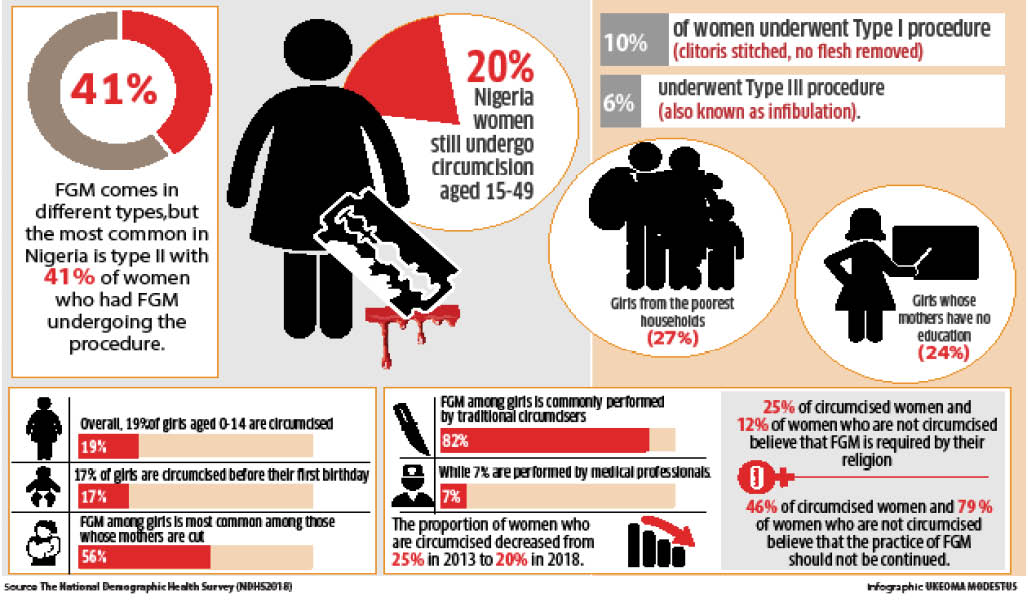Despite advocacy against Female Genital Mutilation (FGM), 20 percent of Nigerian women still undergo genital cutting, the National Demographic Health Survey (NDHS2018) result stated.
FGM, also known as female genital cutting or female circumcision, is defined by the World Health Organisation (WHO) as any procedure that involves partial or total removal of the external genitalia and/or injury to the female genital organs whether for cultural or any other nontherapeutic reasons.
The survey report revealed that the most common type of FGM in Nigeria is Type II (some flesh removed), with 41 percent of women undergoing the procedure. Meanwhile, 10 percent of women underwent a Type I procedure (clitoris stitched, no flesh removed) and 6 percent underwent a Type III procedure (also known as infibulation).
According to the newly released data, overall, 19 percent of girls aged 0-14 are circumcised. 17 percent of girls are circumcised before their first birthday. FGM among girls is most common among those whose mothers are cut (56%), whose mothers have no education (24%), and those from the poorest households (27%). FGM among girls is most commonly performed by a traditional circumciser (82%), while 7% are performed by a medical professional.
The United Nations Children Funds (UNICEF) Planning and Monitoring Specialist, Maureen Zubie-Okolo, at a Media Dialogue for Editors and Reporters on Data-Driven Reporting and Dissemination of NDHS 2019 recently revealed that FGM is enshrined in people’s belief system and rooted in culture hence the difficulty of eradicating it.
According to the World Health Organisation (WHO), FGM is widely recognised as a violation of human rights, and deeply rooted in beliefs and perceptions over decades and generations.
Mrs Zubie-Okolo said the prevalence of FGM is by region in Nigeria, adding that the proportion of women who are circumcised decreased from 25 percent in 2013 to 20 percent in 2018.
“The prevalence of circumcision seems to be decreasing in Nigeria. By ethnic group, the prevalence of FGM is highest among Yoruba women (35%) and lowest among Tiv and Igala women (1% each). The prevalence of FGM is highest in the South East (35%) and South West (30%) and lowest in the North East (6%).
“Twenty percent of women are circumcised, 25 percent of circumcised women and 12 percent of women who are not circumcised believe that FGM is required by their religion while 46 percent of circumcised women and 79 percent of women who are not circumcised believe that the practice of FGM should not be continued.
Mrs Zubie-Okolo advocated for the involvement of traditional rulers in order to end the ugly practice in the country, adding that they are looking at the pattern across the north and that Kaduna State stood out as having the higher percentage the north.
A consultant gynecologist, Dr Henry Osazuwa, said FGM should be discouraged because it has no proven benefit.
He said in areas where the practice is the cut (excise), the clitoris can get infected because it is often carried out in unhygienic environment and it can also lead to severe pain.
He also said in addition to the above complications, fibrosis (hardening of tissue) can form around the vagina entry which can cause painful intercourse (dyspareunia), difficulty with childbirth and perineal tears during childbirth.
“In childhood or later in life, a cyst can form (Clitoral cyst). In some areas, the practice goes beyond removing the clitoris to include parts of the vagina (labia minora and majora).”
Dr Osazuwa also said the practice has deep roots in traditional practice so, stopping it is easier said than done, like corruption in our society because cultural beliefs play an important role but consistent education is very important in trying to create awareness among the younger generation.

 Join Daily Trust WhatsApp Community For Quick Access To News and Happenings Around You.
Join Daily Trust WhatsApp Community For Quick Access To News and Happenings Around You.


